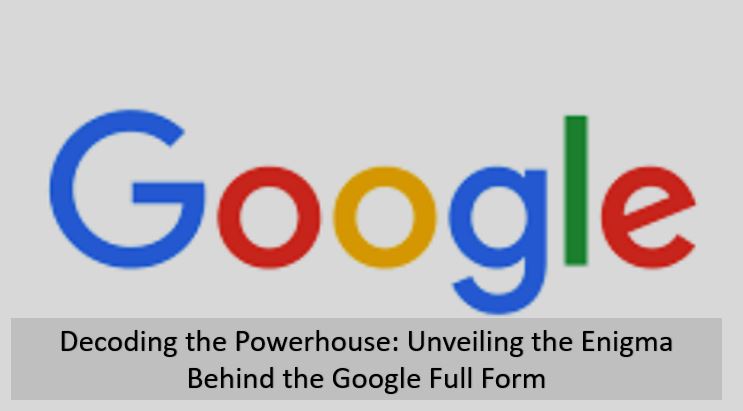Decoding the Powerhouse: Unveiling the Enigma Behind the Google Full Form

Introduction:
In the vast landscape of the internet, Google stands as an undisputed titan, shaping the way we access information, communicate, and navigate the digital realm. While most users interact with Google on a daily basis, the acronym behind its name often remains a mystery. In this comprehensive article, we will delve into the origins and evolution of Google, demystifying the meaning behind its name by exploring the Google full form.
The Genesis of Google:
To understand the full form of Google, we must first travel back to its inception. Google was founded by Larry Page and Sergey Brin, Ph.D. students at Stanford University, in 1998. The duo aimed to create a search engine that could organize the vast information available on the internet and deliver more accurate and relevant results.
The Birth of an Iconic Name:
The term “Google” finds its roots in the word “googol,” a mathematical term representing the number 1 followed by 100 zeros. This choice reflects the founders’ mission to organize an immense amount of information available online. The name signifies the colossal scale of data that Google’s search engine was designed to handle.
Unraveling the Google Full Form:
Contrary to popular belief, Google does not have a specific full form like many other acronyms. Over the years, various humorous and creative expansions have been proposed, but officially, Google does not stand for any particular set of words. It’s important to recognize that Google’s simplicity and universality contribute to its global appeal.
Google’s Evolution Beyond Search:
While Google’s initial mission was to organize the world’s information, the company has evolved far beyond its search engine roots. Today, Google is a multifaceted technology giant with a diverse range of products and services, including but not limited to:
Google Search:
The flagship product that started it all, Google Search remains the most widely used search engine globally.
Google Maps:
Revolutionizing navigation, Google Maps provides real-time directions, location information, and even street-level views.
Gmail:
Google’s email service, known for its user-friendly interface and generous storage capacity.
Google Drive:
A cloud storage service allowing users to store and share files seamlessly.
YouTube:
Acquired by Google in 2006, YouTube is the world’s largest video-sharing platform.
Android:
The operating system that powers a majority of the world’s mobile devices.
Google Chrome:
A popular web browser known for its speed, simplicity, and security features.
Google Workspace:
A suite of productivity tools, including Google Docs, Sheets, and Slides.
Google Assistant:
An artificial intelligence-powered virtual assistant.
Google Cloud:
Providing cloud computing services to businesses and organizations.
Google’s Impact on Society:
As Google expanded its influence, it played a transformative role in how individuals and businesses interact with technology. The company’s commitment to innovation, user-centric design, and a vast ecosystem of products have made it an integral part of the modern digital experience.
The Cultural Phenomenon:
Beyond its technical achievements, Google has become a cultural phenomenon. The brand’s name has transcended its literal meaning, becoming a verb in everyday language. When people say, “Let me Google that,” they are not merely referring to a search engine but engaging with a cultural force that has become synonymous with information retrieval.
Challenges and Controversies:
Despite its widespread success, Google has faced its share of challenges and controversies. Issues related to user privacy, antitrust concerns, and the handling of sensitive data have prompted regulatory scrutiny and public debate.
The Future of Google:
As we look ahead, Google continues to innovate and shape the future of technology. From advancements in artificial intelligence to ambitious projects like self-driving cars and internet-beaming balloons, Google remains at the forefront of technological innovation.
Conclusion:
In conclusion, while the full form of Google may not be a traditional acronym, its name carries profound significance rooted in mathematical enormity. From its humble beginnings as a search engine to its current status as a global technology powerhouse, Google’s impact on the digital landscape is undeniable. As we navigate the ever-evolving world of technology, the legacy of Google as a symbol of innovation, information, and connectivity is sure to endure.








